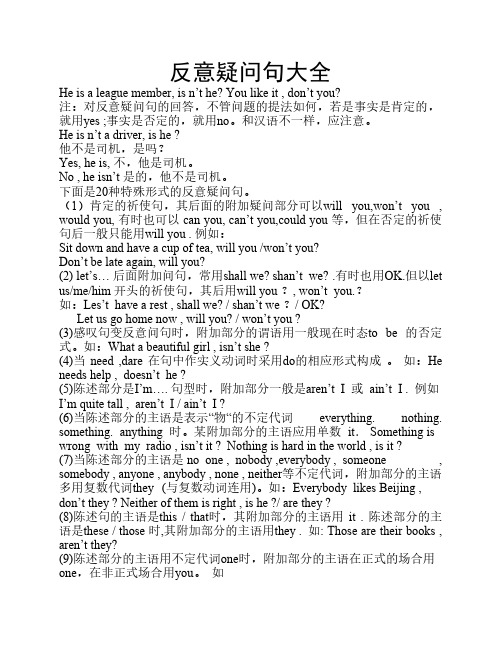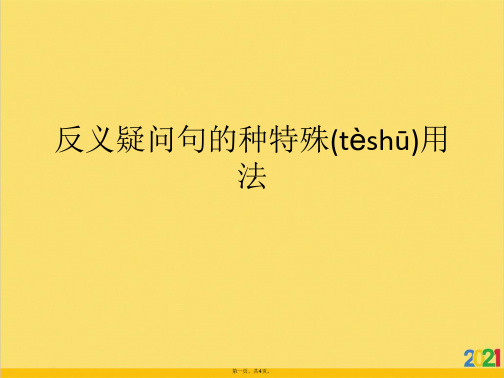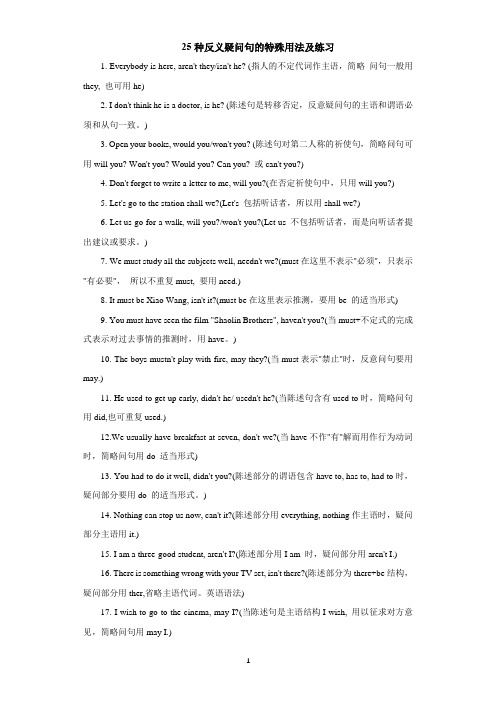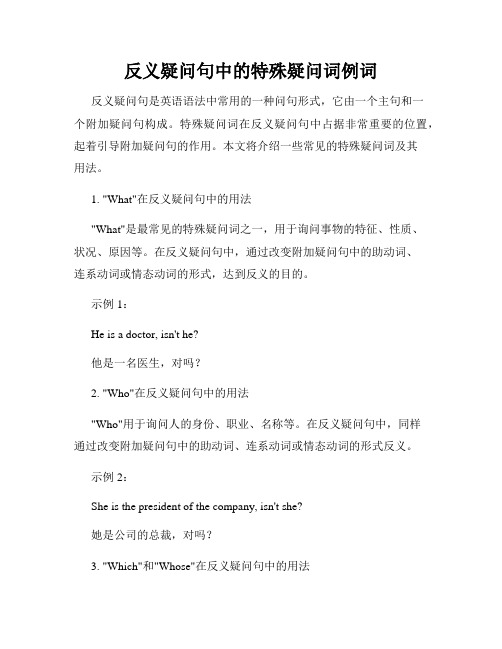反义疑问句的八种特殊形式
反意疑问句大全

反意疑问句大全He is a league member, is n’t he? You like it , don’t you?注:对反意疑问句的回答,不管问题的提法如何,若是事实是肯定的,就用yes ;事实是否定的,就用no。
和汉语不一样,应注意。
He is n’t a driver, is he ?他不是司机,是吗?Yes, he is, 不,他是司机。
No , he isn’t 是的,他不是司机。
下面是20种特殊形式的反意疑问句。
(1)肯定的祈使句,其后面的附加疑问部分可以will you,won’t you , would you, 有时也可以 can you, can’t you,could you 等,但在否定的祈使句后一般只能用will you . 例如:Sit down and have a cup of tea, will you /won’t you?Don’t be late again, will you?(2) let’s… 后面附加问句,常用shall we? shan’t we? .有时也用OK.但以let us/me/him 开头的祈使句,其后用will you ?, won’t you.?如:Les’t have a rest , shall we? / shan’t we ?/ OK?Let us go home now , will you? / won’t you ?(3)感叹句变反意问句时,附加部分的谓语用一般现在时态to be 的否定式。
如:What a beautiful girl , isn’t she ?(4)当need ,dare 在句中作实义动词时采用do的相应形式构成。
如:He needs help , doesn’t he ?(5)陈述部分是I’m…. 句型时,附加部分一般是aren’t I 或 ain’t I . 例如I’m quite tall , aren’t I / ain’t I ?(6)当陈述部分的主语是表示“物“的不定代词everything. nothing. something. anything 时。
反义疑问句

反义疑问句1.含有特殊主语的反意疑问句1)表“人”的不定代词作主语如果陈述句部分的主语是不定代词no one,nobody,everyone,someone,everybody,somebody,none等时,其附加问句的主语当强调全部是可用they,当强调个体时可以用he.No one phoned me while i was out,did they? Everyone is having a good time,aren't they? Someone is expecting you ,isn't he? Everyone knows what money means,does't he /don't they?2)表“物”的不定代词作主语陈述句的主语是everything,anything,something,nothing时,附加问句的主语用it. Everything goes well with you,doesn't it? Nothing has been considered about this meeting,hasn't it?3)one 指“人”时作主语不定代词one 作主语,附加问句的主语在正式的场合用one,在非正式场合用you.One can't be too careful,can one (you )? One should do one's duty,shouldn't one (you)? 4)指示代词作主语当陈述句的主语是指示代词是,其后的附加问句的主语要用相应的人称代词。
即this或that 后用it,these或those后用they.That was a hundred years ago,wasn't it? Those books are yours,aren't they?5)There be结构以表示“存在”的there引导陈述句是,其后的附加问句仍用引导词there.There will be an art exhibition tomorrow,won't there?There used to be a river here,usedn't /didn't there?2.含有特殊动词的反意疑问句1)含有情态动词must意义陈述部分附加句部分必须;禁止You must send for a doctor immediately,You mustn't walk on the grass, mustn't you? must you?有必要We must have a meeting this evening, needn't we?一定;想必对现在的情况的推测You must be very happy, aren't you?对过去的情况推测It must have rained last night, didn't it?对已经完成情况的推测He must have studied Frenchfor many years,hasn't he?2)含有情态动词ought toOught to 的反意疑问句部分用oughtn't 或shouldn't替代She ought to leave here,oughtn't she/shouldn't she/ought she not/should she not? She oughtn't to leave here,ought/should she?3)含有情态动词used toUsed to 的疑问部分用usedn't 和didn't两种形式She used to study in Russia,usedn't she/didin't she?4)含有情态动词had betterHad better的疑问部分用hadn't或shouldn't。
反义疑问句的种特殊用法标准版文档

第二页,共4页。
2.感叹句。感叹句后加反意疑问句时,其反意疑问句需用be的一般现在时态的否 定形式(xíngshì)。 例如: What fine weather, isn't it? 多好的天气啊,是吧?
3.陈述部分主、谓语是I am...时,反意疑问句用aren't I 或ain't I ,而不是am not I (可
第四页,共4页。
7.当陈述部分含有以下这些含有否定意义的词时:few, little, seldom, hardly, never, not, no, no one, nobody, nothing, none, neither等,其反意 疑问句需用肯定结构(jiégòu)。 例如:He is never late for school, is he? 他上学从不迟到,是吗? 当陈述部分所含的否定词是通过加前缀或后缀构成的,其后的反意疑问句 依然用否定结构(jiégòu)。例如:It is unfair, isn't it? 这不公平,是吧?
反义疑问句的种特殊(tèshū)用 法
第一页,共4页。
1.祈使句。祈使句后一般加上will you或won’t you构成(gòuchéng)反意疑问句,用 will you 多表示“请求”,用won't you 多表示提醒对方注意
Look at the blackboard,
will y?ou/ won't you
陈,后述的部反分意主疑、问谓句我语用是s的hIaal收ml w.e音或s机ha出n't w毛e。病了,是吧. 还可以用may I来N表o示th征in求g(zhiēsngrqigiúh)对t 方, 的is同it意?或许可。
当陈述部分含I think (believe, suppose.
25种反义疑问句的特殊用法及练习2022届高考英语二轮专题

25种反义疑问句的特殊用法及练习1. Everybody is here, aren't they/isn't he? (指人的不定代词作主语,简略问句一般用they, 也可用he)2. I don't think he is a doctor, is he? (陈述句是转移否定,反意疑问句的主语和谓语必须和从句一致。
)3. Open your books, would you/won't you? (陈述句对第二人称的祈使句,简略问句可用will you? Won't you? Would you? Can you? 或can't you?)4. Don't forget to write a letter to me, will you?(在否定祈使句中,只用will you?)5. Let's go to the station shall we?(Let's 包括听话者,所以用shall we?)6. Let us go for a walk, will you?/won't you?(Let us 不包括听话者,而是向听话者提出建议或要求。
)7. We must study all the subjects well, needn't we?(must在这里不表示"必须",只表示"有必要",所以不重复must, 要用need.)8. It must be Xiao Wang, isn't it?(must be在这里表示推测,要用be 的适当形式)9. You must have seen the film "Shaolin Brothers", haven't you?(当must+不定式的完成式表示对过去事情的推测时,用have。
反义疑问句特例+就近(远)原则

反义疑问句的特殊情况+就近(远)原则反义疑问句是英语四大问句之一,它是由一个陈述句加上一个短问句而构成的。
反意疑问句的基本构成形式是:陈述句+动词(肯定或否定)+主语?如:①She often has lunch at school, doesn’t she? ②You don’t like sports, do you?使用反意疑问句要注意以下若干对应规则:一、反意疑问句中问句部分的动词与陈述部分的动词在语气上成相反的对应关系,即:肯定+否定?否定+肯定?如:①You can’t do it, can you? ②They are very late for the meeting, aren’t they?二、反意疑问句中问句部分的动词与陈述部分的动词种类要对应一致。
如:①He has supper at home every day, doesn’t he? (不能用hasn’t he?)②They have known the matter, haven’t they? (不能用don’t they?)三、反意疑问句中问句部分的动词在时态上应和陈述部分的时态一致。
如:①They will go to town soon, won’t they?(不能用don’t they?或aren’t they?)②He works very hard, doesn’t he?(不能用didn’t he?或won’t he?)四、反意疑问句的陈述部分含有由un-, im-, in-, dis-, 等否定意义的前缀构成的词语时,陈述部分要视为肯定含义,问句部分用否定形式。
如:①Your father is unhappy, isn’t he?(不能用is he?)②The man is dishonest, isn’t he? (不能用is he?)③It is impossible to learn English without remembering more words, isn’t it?(不能用is it ?)五、反意疑问句的陈述部分带有little, few, never, hardly, seldom等否定意义的词时,问句部分用肯定式。
反义疑问句中的特殊疑问词例词

反义疑问句中的特殊疑问词例词反义疑问句是英语语法中常用的一种问句形式,它由一个主句和一个附加疑问句构成。
特殊疑问词在反义疑问句中占据非常重要的位置,起着引导附加疑问句的作用。
本文将介绍一些常见的特殊疑问词及其用法。
1. "What"在反义疑问句中的用法"What"是最常见的特殊疑问词之一,用于询问事物的特征、性质、状况、原因等。
在反义疑问句中,通过改变附加疑问句中的助动词、连系动词或情态动词的形式,达到反义的目的。
示例1:He is a doctor, isn't he?他是一名医生,对吗?2. "Who"在反义疑问句中的用法"Who"用于询问人的身份、职业、名称等。
在反义疑问句中,同样通过改变附加疑问句中的助动词、连系动词或情态动词的形式反义。
示例2:She is the president of the company, isn't she?她是公司的总裁,对吗?3. "Which"和"Whose"在反义疑问句中的用法"Which"用于询问事物的选择、区分等,"Whose"用于询问所有权。
在反义疑问句中,同样通过改变附加疑问句中的助动词、连系动词或情态动词的形式反义。
示例3:This is the book you want, isn't it?这是你想要的那本书,对吗?4. "When"和"Where"在反义疑问句中的用法"When"用于询问时间,"Where"用于询问地点。
在反义疑问句中,同样通过改变附加疑问句中的助动词、连系动词或情态动词的形式反义。
示例4:The party starts at 8 p.m., doesn't it?聚会从晚上8点开始,对吗?5. "Why"在反义疑问句中的用法"Why"用于询问原因或理由。
反义疑问句(含解析、例句及详尽用法)

反义疑问句之阳早格格创做一、祈使句的反义疑问句1、肯定祈使句Will you?/won’t you?2、可定祈使句Will you?3、Let的祈使句Let us ...,will you?(此处Let us 表示“允许咱们...”)Let’s...,shall we? (此处Let’s表示“让咱们...吧”)Let + 第三人称...,will you?二、Must的反义疑问句1、表示“必须” musn’t /needn’tEg. You must go now, needn’t you?2、表示“禁绝”Eg. You musn’t smoke here, must/may you?3、表示推测,肯定.(I’m sure + 从句)Eg. You must be hungry now, aren’t you?I’m sure you are hungry now, aren’t you?She must have heard about that, hasn’t she?I’m sure you have heard about that, haven’t you?You must have watched that movie last night, didn’t you?(last nigh为简直时间面,所以用普遍往日式)三、主语(反义疑问句)+从句主句:I(don’t)think/believe/consider/suppose 或者I’m afraid/sure...后跟随句时,可将从句部分举止反义疑问Eg. I don’t think he will win, will he?I think he will win, won’t he?She thinks he will win, doesn’t she?(当主句主语没有是I时没有适用于该用法,此句中的翻译疑问针对于的是主句而非从句)四、当句中包罗有表示可定意思的副词汇或者没有定代词汇时,反义疑问句用肯定形式Eg. Nothing happened to him, did it?It is unfair, isn’t it?He dislikes watching TV, doesn’t he?(该句中含可定意思的是动词汇而非副词汇或者没有定代词汇,果此没有适用于该用法,反义疑问句仍旧使用可定形式)五、反义疑问句的回问反义疑问句的回问针对于被提问部分的谓语动词汇,且取回问句前部分的Yes战No脆持普遍Eg. A: You haven’t lost the ticket, have you?B: D I know it’s hard to get another one at this moment.A. Yes, I haven’tB. No, I haveC. I hope soD. I’m afraid not六、报告部分的主语取反义疑问句主语脆持普遍的情况1、OneEg. One can’t be too careful when driving a car, can one/he?一部分正在启车的时间再怎么留神也没有为过.2、This/that/these/those/it/theyEg. This is true, isn’t it?3、Something/nothing/anything/everything,反问句中用itEg. Nothing happened to him, did it?4、当报告部分主语为everybody/everyone/anyone/anybody/nobody/no one等没有定代词汇时,反义疑问句中用he、theyEg. Nobody wants to be laughed at,does he?/Do they?5、当报告句主语为没有定式,句子,动名词汇,反问句中用itEg. Learning English takes a lot of time, doesn’t it?。
初中反意疑问句(特殊形式)很全了

1.陈述部分的主语是I,疑问部分要用 aren't I.或am I not 例:I'm as tall as your sister,aren't I?2.陈述部分的谓语是wish,疑问部分要用may +主语。
例:I wish to have a word with you, may I?3.陈述句部分有否定词(never, not, no one, none, no, nothing,nobody, hardly, seldom, little,few, neither等)时, 疑问部分要用肯定形式.如: He seldom goes home on Sundays, does he? The Swede made no answer, did he / she?注意:若陈述部分含有带否定前缀的词(im-,un-,dis-, in-),疑问部分仍用否定式It is unfair, isn’t it? 这不公平,不是吗? It is impossible, isn’t it? 那是不可能的,是吗?4.陈述部分为I/We think(believe, suppose, consider,sure, afraid,expect,imagine) + that从句时,疑问部分与从句主谓保持一致。
如:We think that English is very useful, isn't it? (不用don't we?)否定形式如:I don't think that you can do it, can you? (不用do I?)要注意到否定的转移问题【注】这类用法主要限于主语为第一人称且think等动词为一般现在时的情形。
5.陈述部分为非第一人称主语+ think(believe, suppose, consider) + that从句时,疑问部分与主句主谓保持一致。
- 1、下载文档前请自行甄别文档内容的完整性,平台不提供额外的编辑、内容补充、找答案等附加服务。
- 2、"仅部分预览"的文档,不可在线预览部分如存在完整性等问题,可反馈申请退款(可完整预览的文档不适用该条件!)。
- 3、如文档侵犯您的权益,请联系客服反馈,我们会尽快为您处理(人工客服工作时间:9:00-18:30)。
反义疑问句的八种特殊形式
1. 前面句子为肯定句,后面为否定疑问句。
如:You like coffee, don't you?(你喜欢咖啡,不是吗?)
2. 前面句子为否定句,后面为肯定疑问句。
如:You don't like coffee, do you?(你不喜欢咖啡,是吗?)
3. 前面句子为肯定且含有否定意义词语,后面为否定疑问句。
如:He hardly ever studies, does he?(他几乎不学习,对吧?)
4. 前面句子为否定且含有肯定意义词语,后面为肯定疑问句。
如:He didn't say anything, did he?(他没说什么,是吗?)
5. 前面句子为陈述句,后面为感叹疑问句。
如:You won the game, didn't you?!(你赢了比赛,是吧!)
6. 前面句子为感叹句,后面为肯定疑问句。
如:What a beautiful day it is, isn't it?(多美的一天啊,是吧?)
7. 前面句子为陈述句,后面为强调疑问句。
如:He is a doctor, isn't he?(他是医生,对吧?)
8. 前面句子为陈述句,后面为选择疑问句。
如:Do you want tea or coffee, don't you?(你想要茶还是咖啡呢?)。
